七年级英语上册Unit4MydayWelcome学案新版牛津版
牛津译林版七年级英语上册《nit 4 My day Welcome to the unit》赛课导学案_14

Unit 4 My dayWelcome to the unit第一部分教案设计教学内容学习如何表达日常活动并向别人描述自己的一天。
教材分析Welcome to the unit是本单元的第一课时,通过Eddie和Hobo之间的对话,引出本单元的主题:我的一天。
通过Millie一天的日常活动安排来了解Millie的学校生活并与自己的进行比较。
教学目标(1)会用本课时的四会单词。
(2)词组wake up have breakfast have fun do after-school activities(3)句型I seldom go out I’m never late for school.基本技能1.介绍日常学习和生活的基本安排和活动;2. 对自己和他人的一天进行简单描述。
综合素质将自己的一天活动进行描述,从中学会合理安排时间并珍惜时间。
教学重难点及突破重点:介绍日常学习和生活的基本安排和活动;难点:对自己和他人的一天进行简单描述。
教学突破:将一天的校园活动制成表格,降低师生对话的难度。
教学准备教师准备:多媒体课件学生准备:预习本课时的内容。
教学设计Step I Lead-in (导入部分)1. Today we’ll learn Unit 4 My day .Discuss in groups :How do you usually spend your day ?2. Present and learn the new words .Step II Presentation(新授部分)1.Listen and answer the questions: What does Eddie do every day ? What does Hobo think of dogs like Eddie ?2.Read after the tape .3.Help Ss understand the following phrases and sentences : 1)wake up 2) Is it time for breakfast ?3)I seldom go out 4) I always need a good rest 5) Some dogs just don’t know how to have fun .4.Work in pairsStep III Present "Welcome to the unit" (新授Welcome to the unit)1.Look at the table of Millie’s day . Please answer my questions : What time does Millie get up ? What does Millie do at 7:00 a.m. every day ? I would like to go to school with Millie . What time can I meet her at her gate ? What does she do at 8:00 a.m. ? How many hours does Millie have lessons every day ? Does she go home at 4:00 p.m. ? What does she do ? What does she do after dinner ? What time does she go to bed ?2.Listen to the tape and answer : Is Millie often late for school ?3.Read after the tape4.Are your daily activities the same as Millie’s ? Complete the table on the right with your own information .5.Work in groups of four to discuss your own day . You can use Mi llie and her aunt’s conversation as a model .6.Each group chooses one student to give a report and introduce the daily activities of the group members .nguage points .Phrases : get up , have breakfast / lunch / dinner , have lessons , do after-school activities , do homework , go to bed Sentences : When do you go to school every day ? What time do you start lessons ?I’m never late for it . At a quarter past eight .随堂小练习一.用所给单词的适当形式填空。
七年级英语上册 Unit 4 My day(第一课时)Revision教案 (新版)牛津版

Unit 4 My day(第一课时)Revision中国书法艺术说课教案今天我要说课的题目是中国书法艺术,下面我将从教材分析、教学方法、教学过程、课堂评价四个方面对这堂课进行设计。
一、教材分析:本节课讲的是中国书法艺术主要是为了提高学生对书法基础知识的掌握,让学生开始对书法的入门学习有一定了解。
书法作为中国特有的一门线条艺术,在书写中与笔、墨、纸、砚相得益彰,是中国人民勤劳智慧的结晶,是举世公认的艺术奇葩。
早在5000年以前的甲骨文就初露端倪,书法从文字产生到形成文字的书写体系,几经变革创造了多种体式的书写艺术。
1、教学目标:使学生了解书法的发展史概况和特点及书法的总体情况,通过分析代表作品,获得如何欣赏书法作品的知识,并能作简单的书法练习。
2、教学重点与难点:(一)教学重点了解中国书法的基础知识,掌握其基本特点,进行大量的书法练习。
(二)教学难点:如何感受、认识书法作品中的线条美、结构美、气韵美。
3、教具准备:粉笔,钢笔,书写纸等。
4、课时:一课时二、教学方法:要让学生在教学过程中有所收获,并达到一定的教学目标,在本节课的教学中,我将采用欣赏法、讲授法、练习法来设计本节课。
(1)欣赏法:通过幻灯片让学生欣赏大量优秀的书法作品,使学生对书法产生浓厚的兴趣。
(2)讲授法:讲解书法文字的发展简史,和形式特征,让学生对书法作进一步的了解和认识,通过对书法理论的了解,更深刻的认识书法,从而为以后的书法练习作重要铺垫!(3)练习法:为了使学生充分了解、认识书法名家名作的书法功底和技巧,请学生进行局部临摹练习。
三、教学过程:(一)组织教学让学生准备好上课用的工具,如钢笔,书与纸等;做好上课准备,以便在以下的教学过程中有一个良好的学习气氛。
(二)引入新课,通过对上节课所学知识的总结,让学生认识到学习书法的意义和重要性!(三)讲授新课1、在讲授新课之前,通过大量幻灯片让学生欣赏一些优秀的书法作品,使学生对书法产生浓厚的兴趣。
牛津译林版七年级英语上册《nit 4 My day Welcome to the unit》赛课导学案_11
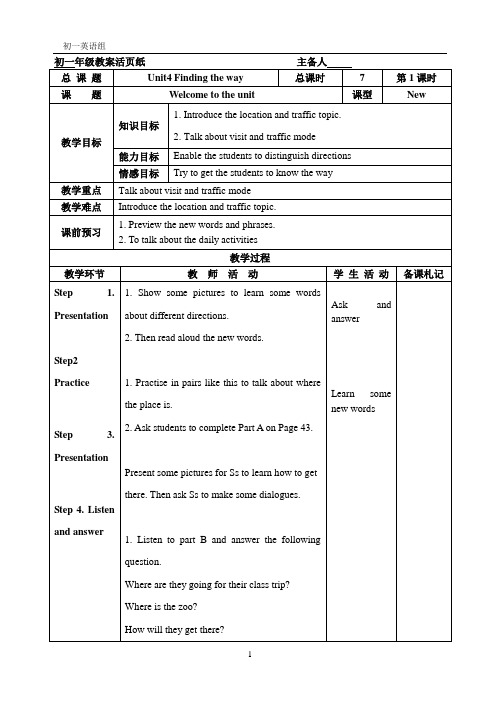
Step 5. Learn the conversation
Step 6. Explanation
Step 7. Exercises
Homework:
1. Show some pictures to learn some words about different directions.
2. Learn to talk about Ss’ own trips.
能力目标
Learn totalk about Ss’ own trips
情感目标
Get the students to loveanimals
教学重点
Learn the language points in this article.
How will they get there?
2. Read after the recorder.
3. Practice in pairs.
4. Act it out.
5. Make their own dialogue.
1. Listen to the tape and ask:
1). Where are Hobo and Eddie standing?
there. Then ask Ss to make some dialogues.
1. Listen to part B and answer the following question.
Where are they going for their class trip?
Where is the zoo?
2.lie down
3. all day long
2019-2020年七年级英语上册《Unit4 ma day Welcome to the unit》教案 牛津版
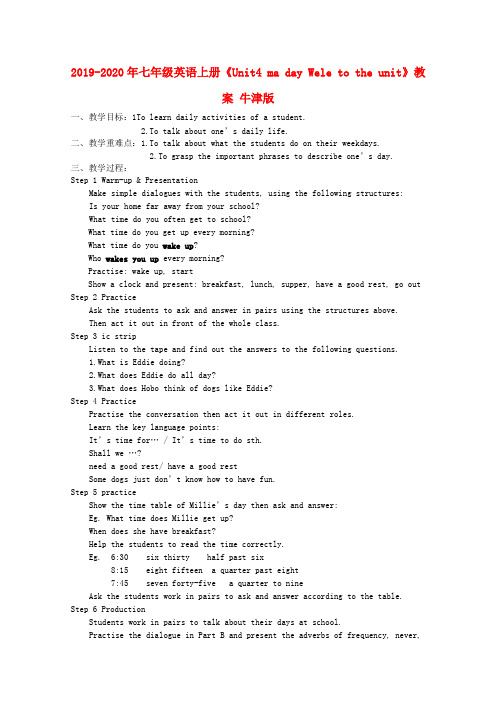
2019-2020年七年级英语上册《Unit4 ma day Wele to the unit》教案牛津版一、教学目标:1To learn daily activities of a student.2.To talk about one’s daily life.二、教学重难点:1.To talk about what the students do on their weekdays.2.To grasp the import ant phrases to describe one’s day.三、教学过程:Step 1 Warm-up & PresentationMake simple dialogues with the students, using the following structures:Is your home far away from your school?What time do you often get to school?What time do you get up every morning?What time do you wake up?Who wakes you up every morning?Practise: wake up, startShow a clock and present: breakfast, lunch, supper, have a good rest, go outStep 2 PracticeAsk the students to ask and answer in pairs using the structures above.Then act it out in front of the whole class.Step 3 ic stripListen to the tape and find out the answers to the following questions.1.What is Eddie doing?2.What does Eddie do all day?3.What does Hobo think of dogs like Eddie?Step 4 PracticePractise the conversation then act it out in different roles.Learn the key language points:It’s time for… / It’s time to do sth.Shall we …?need a good rest/ have a good restSome dogs just don’t know how to have fun.Step 5 practiceShow the time table of Millie’s day then ask and answer:Eg. What time does Millie get up?When does she have breakfast?Help the students to read the time correctly.Eg. 6:30 six thirty half past six8:15 eight fifteen a quarter past eight7:45 seven forty-five a quarter to nineAsk the students work in pairs to ask and answer according to the table.Step 6 ProductionStudents work in pairs to talk about their days at school.Practise the dialogue in Part B and present the adverbs of frequency, never,seldom, usually, often to the students.Help the stuents use them correctly to talk about their day at school.Learn important language points:be late for…start lessonsStep 6 HomeworkRecite the important verb phrases.Try to describe their own days at school.Do the exercises in the workbookPreview Part Reading2019-2020年七年级英语上册《unit4 my day Grammar》同步练习1(无答案)牛津版一、根据对话内容,用适当的人称代词完成下面的对话。
合水县师院附中七年级英语上册Unit4MydayWelcometotheUnit作业设计新版牛津版

7A Unit 4 My dayPeriod1 (Comic strip & Welcome to the unit)一、重点词组、句型。
1.醒来 ________________________2.是吃早饭的时间了__________________________3.去山上散步____________________ 4.我很少外出。
____________________5.有些狗就是不知道如何获得乐趣。
_______________________________________6.做早操 ______________________ 7.进行课外活动__________________8. 上学迟到______________________ 9.做家庭作业____________________10.晚饭后我总是需要好好休息。
_______________________________________11.在八点一刻______________________二、单词拼写1.That’s_________(恰恰)what I want to buy.2.My brother always __________(醒)up early.3.We have no__________(课)on Saturdays or Sundays.4.Let’s __________(开始)our class with an English song.5.My father__________(很少)goes to school on foot。
6.Six fifteen means(意思是)a quarter__________(超过)six.7.Don’t go____________(外出),Amy.It’s raining.8.Our school is in the_______ (小山).三、单项选择( )1. I don't think fast food is good for our health, so I______ go to MacDonald.A. seldomB. alwaysC. usuallyD. often( )2. -_______do you usually get up in the morning?-I usually get up at 6:00 a.m.A. WhatB. WhenC. HowD. Where ( )3. I usually_______ at 11:50 a.m.A. get upB. go to schoolC. have lunchD. go to bed ( )4. -I am very hungry, Mum. May I have something to eat?-What about some_______?A. waterB. milkC. orange juiceD. bread ( )5 .I am very tired.1 want to_______.A. have a good restB. have a glass of waterC. have funD. go walking with you四、句型转换1.It is 8:00 a.m. now.(对画线部分提问)_______ _______ _______ it now?2.They know how to make kites.(改为否定句)They_______ _______.how to make kites.3.Get up, Jim.(改为否定句)_______ _______ _______,Jim.4.I usually have dinner at 6:30 p.m.(改为一般疑问句)_______ _______usually have dinner at 6:30 p.m.?5.It is time for supper.(同义句转换)It is time_______ ________supper.五、完形填空My name is Sandy. I usually l up at six twenty. Then I have 2 at about six forty. I go to school at 3 o'clock. And my 4 begin at eight o'clock. We 5 four classes in the morning and two in the 6 .I have lunch at school at about twelve o'clock. I often 7 basketball at four on the playground. I 8 at about five thirty in the afternoon. My mother 9 food for me in the evening. After supper I do my homework. I 10 at nine o'clock. This is my day.( )1. A. look B. get C. come D. stand( )2. A. breakfast B. lunch C. supper D. dinner ( )3. A. five B. six C. seven D. eight ( )4. A. days B. classes C. weeks D. hours ( )5. A. start B. begin C. there are D. have( )6. A. morning B. afternoon C. evening D. night ( )7. A. play B. buy C. fly D. make( )8. A. go to school B. go homeC. go swimmingD. go shopping( )9. A. buys B. does C. cooks D. has ( )10. A. do my homework B. do some shoppingC. do some cleaningD. go to bed【答案】三.ABCDA五.BACBD BABCD第五课时Section B (2a)Self Check1.重点单词:high, ago, tent, moon, surprise, snake, scared, move, start, jump, wake, into, forest, ear,India2.重点短语:high school, two weeks ago, put up, look out of, get a surprise, shout to, wake up3.重点句式:My sister finished high school two weeks ago.We put up our tents and made a fire to keep us warm and cook food on.I was so tired that I went to sleep early.We saw a big snake sleeping near the fire.We shouted to our parents to let them know about the danger.My dad started to jump up and down in their tent.This woke the snake up and it moved into the forest by the lake.1.重点短语和句型2.能够用一般过去时态描述过去的某一天发生的事情1.重点短语和句型2.能够用一般过去时态描述过去的某一天发生的事情一、预习课本P71-72新单词并识记,完成下面的汉译英。
牛津译林版七年级英语上册《nit 4 My day Welcome to the unit》赛课导学案_15

7A Unit4 My dayWelcome to the unitTeaching procedure:Step1. Free talkTalk about the activities we often do in a day with students.Step2. PresentationPresent pictures about Hobo and Eddie. Ask students to listen and answer.●Does Eddie get up late?●What are Eddie’s favourite activities?●What does Hobo think of some dogs?●What do you think of Eddie, a hardworking dog or a lazy dog?Step3. Practice1. Work in pairs, then act it out.2. Talk about Eddie’s day accord ing to the dialogue.Step 4. Presentation1. Present words and phrases and learn them.2. Present Millie’s activities and understand some phrases.Step5. Practice1. Present Millie’s day and ask students to make a dialogue like this:A: When does Millie usually get up?B: She usually gets up at 6:30.A: When does Millie usually go to bed?B: She usually goes to bed at 9:30.2. Ask students to talk about their activities in a day in groups of four, and fill in the form on P23.Step 6. ConsolidationAsk students to give a talk about your activities in a day with the phrases they have learned in class.Step 7. Summary1. Which do you like better?Millie’s day :busy, happy, wonderful, learn a lot of things, make friends,chat with friends…Eddie’s day:lazy, boring, unhealthy, lonely…2.Time is life and when the idle man kills time, he kills himself.时间就是生命,懒人消耗时间就是消耗自己的生命。
新牛津7A unit4 My day教案

S13:On the playground..
T:Does Eddie do any activies?
S14:No, he doesn’t. He only wants to sleep.
Learn the new word and the dialogue
教学设计
Teaching aids: A computer, notebooks and work sheets.
Teaching methods: Listening 、reading、acting& Discussing
教 学 过 程
教师活动内容、方式
学 生 活 动
备注(个性化设计)
Step I Free talk
What’s Millie’s school called?
When does Millie’s school start?
On what days dots Millie go to school in a week?
What lesson does Millie Like?
What does Millie do after class?
1.复习本课所学2.《练习册》第1课时
Finish the homework.
板书设计
Unit 4 My Day
Comic strip & welcome to the unit
Try to do “T” or “F” questions according to the table.
(1) Mille has assembly at 7:30.
七年级英语上册 Unit 4 My day Comic strip and Welcome to the unit教案 新牛津版

It’s time to _______.
It’s _____ at noon.
It’s time to ____________.
It’ s _____ in the afternoon.
It’s ti me to ______________________.
T:Let’s talk about each picture in Comic strip.
1 What does Hobo say to Eddie?
2 Who wakes up Eddie every day?
3 What does Eddie ask?
4 What is Eddie going to do?
Unit 4
1、知识目标:
1)本课时的四会单词
2)词组: wake up , get up , go to sleep , have lunch , eat supper ,have lessons
3)句型: Is it time for breakf ast?/I get up at 6:30 .
学生活动串设计
目标达成反馈串设计
Part One Comic strip
Step 1. lead-in
Step2 Presentation
Step3. Read
Step4. Practice
Step6.Presentation
Step7. Practice.
Step8 Listen
Step 9.
Homework
Hi, everyone! I am going to tell you
something about my master Eddie. Eddie never _______ ______ early. So I ______ him ______ever y day. After breakfast, he wants to ____ ____ _______ , then he has _______. Look! It’s 12:30 p.m.. It’s time _____ lunch,But he is still sleeping. And I am sure, he
牛津译林版七年级英语上册《nit 4 My day Welcome to the unit》赛课导学案_1

What time is it?Teaching aims:Knowledge aim: students can know how to ask the time and answer it by leaning key sentence:what time is it? It`s 5 o`clock.Ability aim: students can use these key sentences into real life.Emotional aim: students can get more interested in English and cultivate awareness about treasuring time.Teaching key point &difficult point:key point: students can know how to ask for time and answer it.Difficult point: students can put these sentences into practice.Teaching procedures:Step1 Warming-upHello! Boys and girls! It`s your beloved English teaching Albert. Nice to see you guys again! Before this class, I will share a group of pictures with everyone. What`s in it? A person? Right. And? The sun! Correct! And what? Come on! Keep your sharp eyes open. Excellent! And the person`s shadow. Now can you tell me what`s the difference among them? Think about it. Coco, please. Wonderful! Coco said “the length of the shadow is changing.” So what makes this change? The position of the sun? Yes, maybe. But what really makes this happen is time. Time is amazing! so today we`re goingto know more about time. let`s step into our new class, what time is it?Step2 PresentationOk,guys,look at me!What`s in my hands? It`s a clock! So what time is it? How to answer it? It`s 5? well, in oral English, which is ok. But formally, we should say it`s 5 o`clock. Ok, once again. I ask and you guys answer. What time is it? It`s 5 o`clock.Ok, now, look at my clock again. This time is different. The hour hand points to 5 and the minute hand point to 3. What time is it? Nobody knows? It`s… right! it`s Five-Fifteen. And we can also say it`s quarter after5. Clear? Now, repeat after me. What time is it? It`s quarter after 5.Well, let`s change time again. Look at this clock, the hour hand points to 5 and the minute hand points to 6. What time is it? Think about what we just have learned and tell me. Adam, you please. Yes, right! It`s five-Thirty or half past five. You`re such a clever boy!Step3 PracticeOk, guys, time to have some practice. I will change this clock`s time and then i will ask you guys “what time is it?”. Then you need to answer me with what we just have learned. All right? Good, let`s do this.What time is it? It`s 5.What time is it? It`s half past 5.What time is it? It`s quarter past 5.Well, well. Everyone did a really good job and you guys are so active in class. As your English teacher, I`m so proud of you.Step4 ProductionNext, we`re going to game! Hooray! Game time! This game is called drawing and guessing. Two students in one group. One needs to give the time when you get up and draw a clock with the time. The other have three chances to guess. When the right answer is found, game is over. Remember use the sentences that we have learned. Clear? Begin!Everyone is active in this game. Good job!Step5 Summary & HomeworkTime flies, it`s almost the end of this class. Lets do a simple summary together. What we have learned today? Right, we have learned how to ask the time and answer it. Time is the most precious thing that we have. Guys, we can never waste of time, ok? Finally, after this class, you need draw a painting about time. Any form is ok. And we will share it next class, class is over. See you next class.Blackboard Design。
七年级英语上册 Unit 4《My day》(Grammar)导学案(新版)牛津版
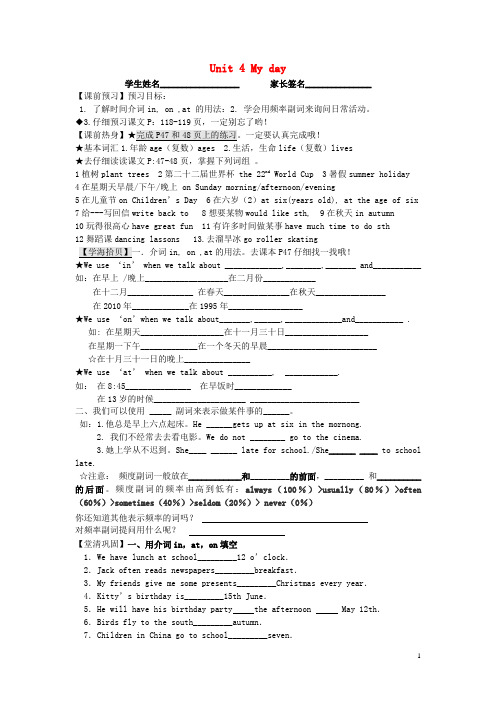
Unit 4 My day学生姓名__________________ 家长签名_______________【课前预习】预习目标:1. 了解时间介词in, on ,at 的用法:2. 学会用频率副词来询问日常活动。
◆3.仔细预习课文P:118-119页,一定别忘了哟!★基本词汇1.年龄age(复数)ages 2.生活,生命life(复数)lives★去仔细读读课文P:47-48页,掌握下列词组。
1植树plant trees 2第二十二届世界杯 the 22nd World Cup 3暑假summer holiday4在星期天早晨/下午/晚上 on Sunday morning/afternoon/evening5在儿童节on Children’s Day 6在六岁(2)at six(years old), at the age of six 7给---写回信write back to 8想要某物would like sth, 9在秋天in autumn10玩得很高心have great fun 11有许多时间做某事have much time to do sth12舞蹈课dancing lassons 13.去溜旱冰go roller skatingin, on ,at的用法。
去课本P47仔细找一找哦!★We use ‘in’ when we talk about _____________,________,_______ and___________如:在早上 /晚上___________________在二月份____________在十二月_______________ 在春天_______________在秋天________________在2010年_____________在1995年_________________★We use ‘on’when we talk about_______,______,_____________and___________ .如: 在星期天___________________在十一月三十日___________________在星期一下午_____________在一个冬天的早晨_________________________☆在十月三十一日的晚上_______________★We use ‘at’ when we talk about __________, ____________.如:在8:45_______________ 在早饭时_____________在13岁的时候_____________________ _________________________二、我们可以使用 _____ 副词来表示做某件事的______。
江苏省徐州市沛县杨屯中学七年级英语上册 Unit 4 My day Welcome to the unit学案(无答案)(新版)牛津版
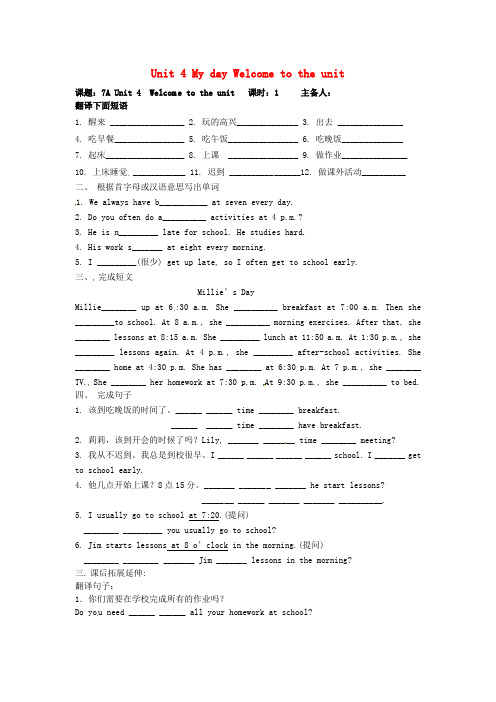
Unit 4 My day Welcome to the unit课题:7A Unit 4 Welcom e to the unit 课时:1 主备人:翻译下面短语1. 醒来 _________________2. 玩的高兴______________3. 出去 _______________4. 吃早餐________________5. 吃午饭________________6. 吃晚饭______________7. 起床__________________ 8. 上课 ________________ 9. 做作业_______________10. 上床睡觉 ____________ 11. 迟到 ________________12. 做课外活动__________二、根据首字母或汉语意思写出单词1. We always have b___________ at seven every day.2. Do you often do a__________ activities at 4 p.m.?3. He is n_________ late for school. He studies hard.4. His work s_______ at eight every morning.5. I _________(很少) get up late, so I often get to school early.三、完成短文Millie’s DayMillie________ up at 6:30 a.m. She __________ breakfast at 7:00 a.m. Then she _________to school. At 8 a.m., she __________ morning exercises. After that, she ________ lessons at 8:15 a.m. She _________ lunch at 11:50 a.m. At 1:30 p.m., she _________ lessons again. At 4 p.m., she _________ after-school activities. She ________ home at 4:30 p.m. She has ________ at 6:30 p.m. At 7 p.m., she ________ TV. She ________ her homework at 7:30 p.m. At 9:30 p.m., she __________ to bed.四、完成句子1. 该到吃晚饭的时间了。
学年七年级英语上册 Unit 4 My day CW教案 (新版)牛津版

1. Present Millie’s day and ask students to make a dialogue like this:
A: When does Millie usually get up? B: She usually gets up at 6:30.
Step 3. Consolidation
Ask students to give a talk about your activities in a day with the phrases they have learned in class.
Write daily activities on the blackboard,
Unit 4
集备部分
课题
7A Unit 4 CW
中心发言人
时间
Teaching Aims:
1.Teaching aims:
1) To talk about routines and activities
2) To daily life.
2. Teaching methods:
4. Teaching aids:Tape , pictures and so on
5. Teaching Procedures:
Comic strip
Step1. Free talk
1. Talk about the activities we often do in a day with students.
教后感:
do homework go to bed
Ask: What time do you do morning exercises?….Slide show ( Millie’s day)
七年级英语上册Unit 4 My day复习学案新版牛津版
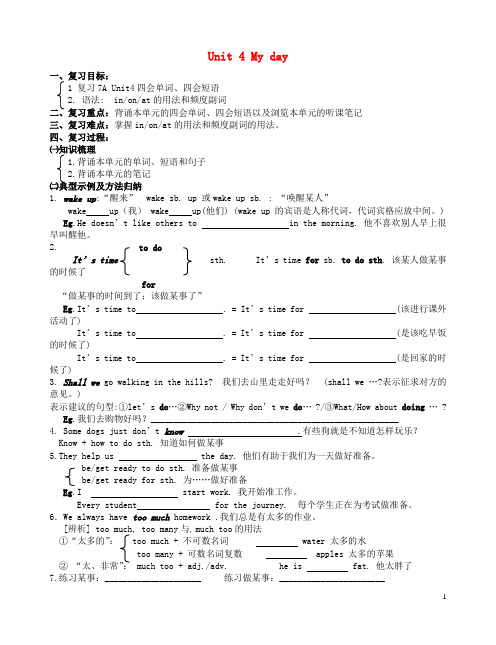
Unit 4 My day一、复习目标:1 复习7A Unit4四会单词、四会短语2. 语法: in/on/at的用法和频度副词二、复习重点:背诵本单元的四会单词、四会短语以及浏览本单元的听课笔记三、复习难点:掌握in/on/at的用法和频度副词的用法。
四、复习过程:㈠知识梳理1.背诵本单元的单词、短语和句子2.背诵本单元的笔记㈡典型示例及方法归纳1. wake up:“醒来” wake sb. up 或wake up sb. : “唤醒某人”wake up(我) wake up(他们) (wake up 的宾语是人称代词,代词宾格应放中间。
) Eg.He doesn’t like others to in the morning. 他不喜欢别人早上很早叫醒他。
2. to doIt’s time sth. It’s time for sb. to do sth. 该某人做某事的时候了for“做某事的时间到了;该做某事了”Eg.It’s time to . = It’s time for (该进行课外活动了)It’s time to . = It’s time for (是该吃早饭的时候了)It’s time to . = It’s time for (是回家的时候了)3. Shall we go walking in the hills? 我们去山里走走好吗? (shall we …?表示征求对方的意见。
)表示建议的句型:①let’s do…②Why not / Why don’t we do… ?/③What/How about doing… ?Eg.我们去购物好吗?______________________________________________________4. Some dogs just don’t know .有些狗就是不知道怎样玩乐?Know + how to do sth. 知道如何做某事5.They help us the day. 他们有助于我们为一天做好准备。
泗阳县第二中学七年级英语上册Unit4MydayWelcometotheUnit教案新版牛津版

Unit 4 My dayWelcome to the unit教学目标1.知识目标:1) 四会单词:wake / seldom / need / rest2) 词组:get up, do morning exercises, wake up, have breakfast / lunch / dinner, go out, have fun3) 句型:It’s time for sth2.能力目标:能够运用已学知识,描述自己的学校作息时间。
3.情感目标:学会合理安排时间,热爱自己的校园生活。
重点难点1.掌握新单词和词组。
2.能够运用已学知识,描述自己的学校作息时间。
教学过程一、热身1.口语交流:T:What time do you usually get up?When do you go to school every day?S:…2.教师出示不同的时间和活动,让学生用英语描述图片。
e.g. They do morning exercises at 8 o’clock.二、呈现新课(一)welcome to the unit1. 教师教学本节课的新单词。
2. 学生朗读这些英语单词,并用这些英语单词造句。
3. 学生根据自己的实际情况完成课本的A题,教师核对答案,并且讲解A题。
4. 听B部分的录音,回答下列问题When does Millie go to school every day?What time does Millie start lessons every day?5. 学生听录音跟读对话内容。
6. 两人一组,参照B的对话内容,编写新的对话,并且表演新的对话。
(二)comic strip1.学生听录音回答问题What’s Edd ie going to do after breakfast?2.学生跟读录音,一起大声朗读对话,并且回答下列问题Does Eddie get up late?Yes, he does.What are Eddie`s favourite activities?He likes eating and sleeping.What does Hobo think of some dogs?Some dogs don`t know how to have fun.What do you think of Eddie, a hardworking(勤劳) dog or a lazy(懒惰) dog?He is a lazy dog.3.学生观看视频,模仿对话。
- 1、下载文档前请自行甄别文档内容的完整性,平台不提供额外的编辑、内容补充、找答案等附加服务。
- 2、"仅部分预览"的文档,不可在线预览部分如存在完整性等问题,可反馈申请退款(可完整预览的文档不适用该条件!)。
- 3、如文档侵犯您的权益,请联系客服反馈,我们会尽快为您处理(人工客服工作时间:9:00-18:30)。
Unit 4 Welcome to the un it 【学习目标】掌握本节课重要的词汇、词组、句子学会谈论日常安排和活动。
能够在语篇层面上对一天的活动安排进行简单描述。
【课前预习】翻译下列短语:1. 醒来2. 叫醒某人3. 午饭后4. 去睡觉5. 如何获得乐趣6. 做早操6. 进行课外活动8. 上课9. 去散步10. 吃晚饭11 . .是吃早饭的时候了【学习过程】Stepl. Free talkHave a free talk with stude nts.Step2. Prese ntati on1. lear n the use of time.2. Prese nt words and phrases and lear n them.3. Present Millie ' s activities and understand some phrases.Step3. Practice1. Present Millie ' s day and ask students to make a dialogue like this:A: When does Millie usually get up? _____B: She usually gets up at 6:30. ______A: When does Millie usually go to bed? ______B: She usually goes to bed at 9:30. ______2. Talk about your own school life using the con versati on as a model.Step 4. Prese ntati onPrese nt pictures about Hobo and Eddie. Ask stude nts to liste n and an swer.Does Eddie get up late?What are Eddie ' s favourite activities?What do you think of Eddie, a hardwork ing dog or a lazy dog? Step5. Practice1. Liste n and repeat the di alogue.2. Work in pairs, the n act it out.3. Talk about Eddie ' s day according to the dialogue.Step 6. SummaryUseful expressi ons:Step7.Homework:1. Remember the new words and expressi ons in this less on.【当堂训练】汉译英。
(两种方法)1、6:30 ___________________ _______________________2、7:20 ___________________ ______________________3、9:35 ___________________ _________________________4、9:50 ___________________ ____________________5、4:45 ___________________ _________________________6、11:15 __________________ _______________________【课后提升】一、用所给词的正确形式填空。
1. My father has fun ___________ (watch)TV at home at weeke nds.2. What day is the __________ (one) day of a week?3. It ' s time for ____________ (she) _________ (play) the violin.4. The woma n in blue is the ________ (tw in) mother.5. Lucy, _____ ________ (not close) the door, it ' s too hot.6. He always _________ (have) his first less on at 7:30.7. _________ your father ofte n _________ (talk) to you af ter supper?8. She usually __ ____ (help) her mother ___________ (look) after her younger sister.9. The girl _________ (not know) how __________ (play).10. Which do you like _________ (good), apples, oran ges, or pears?11. The boy with his sister _ _ (study) in a middle school.二、根据句子意思好所给的提示,完成单词。
1.There are a lot of trees on these __________ ( 小山)in spring.2.She is ________________ ( 彳艮少)late for school.3. The children have lots of ________ ( 乐趣)at the weekend.4. They usually have breakfast at a _______ (一刻钟)to eight at home.5. He ofte n goes walki ng at five ________ ( 晚于)seve n a.m..6. Father is sleeping. Don ' t w ___________ h im up.7.It ' s nine thirty now. it ' s time to go to b _____________ . Good night.8. ---S ______ we g -o swimmi ng this after noon? --- That' s a good idea.9. My fater needs a good r _____ after a day ' s work.10. We ofte n do many after-school _______________ ( 活动)every day.二•单选。
()1.She really doesn ' t know how ____________ a letter in English.A.writeB. to writeC. writ ingD. writes()2. - Mum, can you ________ at 8:00 tomorrow morning? --Of course, dear.A.wakes me upB.wake I upC.wake up meD.wake me up()3. It ' s time _________________ an En glish less on now.A.havi ngB.to havi ngC.haveD.for()4. His mother is very busy,so she ___________ w atches TV.A.ofte nB.alwaysC.seldomually()5.The stude nts have fun ____________ in the football field.A.playB.playi ngC.to playD.plays三、根据汉语提示,完成句子。
1. 西蒙上学从不迟到。
Sim on ___________________________________________________ .2. 现在别出去了,我们八点就开始上课了。
Don' t _____________________ now. We _____________________ a t 8 a.m.3. 午饭后我通常休息一会儿。
____________________ , I usually _______________________________ .4. 格林一家通常在六点一刻吃晚饭。
The Greens usually __________ __________ a t ________________________________ six.5. 那学生通常醒的很早。
The stude nt usually ______________________________ 。
6. 我们需要两袋大米。
We _________ two _______________________________ .7. 他太累了。
他需要好好休息一下。
He is ______________________ . He __________ ________________________________ .四、完形填空Xiao Lin has a good friend. 1 ______ name is Lucy. She ' s from the 2 .She is America n. Xiao Lin and Lucy are in 3 same class. They go to school five days a4,They stay 5 home on Saturday and Sun day. Lucy 6 Ch in ese and Chin ese food.Her favourite food are rice and cakes. At school they play football 7 class. ___Xiao Lin and Lucy like 8 things. Now they like flying planes 9 Saturday and Sun day. Lucy can 10 Chin ese. They are good frien ds.( )1 .A. She B. Her C. Hers D. She s( )2. A. USA B.UN C. UK D. SAR( )3. A. a B. an C. the D./( )4. A mon th B. year C.hour D. week( )5. A. in B. on C. at D. of( )6. A. like B. likes C. liking D. is lik ing( )7. A. at B. for C. after D. i n( )8. A. make B. making C. do D. doing( )9. A. at B. from C. on D. i n( )10 A. say B tell C. talk D.speak中考链接()He _________ takes exercises, so the doctor asks him to do some running and morning exercises..A. ofte nB. alwaysC. seldomD. sometimes。
